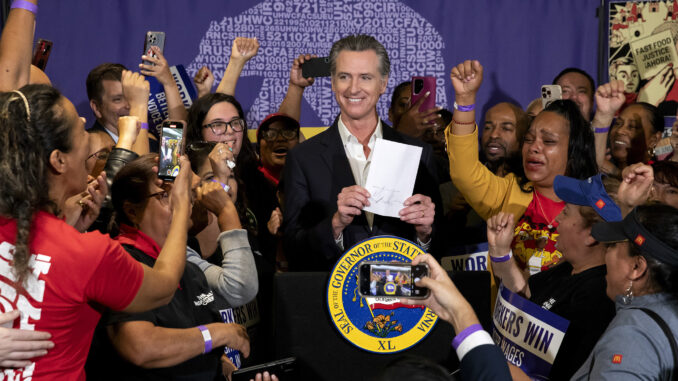
With tears in her eyes, Anneisha Williams, a Jack in the Box employee from Inglewood, lifted the piece of paper that was Assembly Bill 1228 with Gov. Gavin Newsom’s fresh signature. The measure will raise the minimum wage for fast food workers to $20 an hour next April and create a council to set labor standards.
Before Newsom signed the bill Thursday, in front of a crowd at SEIU offices in downtown Los Angeles that included labor leaders, union members and Assemblymember Chris Holden of Pasadena (the bill’s author), Williams recounted the monumental effort it took to push the measure through (“Boy, were these some tough mountains’”), and dedicated the moment to those who came before her.
- Williams: “This is for my ancestors. This is for all the farm workers, all the cotton pickers, this is for them. We ride on their shoulders because they fought some rocky roads as well…. This is our blood, this is our sweat and this is our tears.”
The law is contingent on the restaurant industry formally withdrawing its November 2024 referendum to overturn a fast food council law passed last year. The governor acknowledged this political maneuvering during the signing, as well as the costly campaigning both industry and labor groups likely saved themselves.
- Newsom: “This wasn’t easy. There were 100-plus hours in the last few months negotiating this referendum off the ballot. That was a tectonic plate that had to be moved.”
But as Alejandra Reyes-Velarde of CalMatters’ California Divide team points out, while the $20 minimum wage is higher than the $16 statewide minimum that starts Jan. 1, it’s still not a living wage for many families. Read more from workers in her story.
Meanwhile, leaders in the restaurant industry reacted positively, albeit cautiously. Sean Kennedy, the National Restaurant Association’s executive vice president of public affairs, said in a statement that “there are significant challenges created by this law that restaurants will have to navigate,” but that they will be able to do so under “stable and predictable regulation.”
Despite this victory, labor groups are still hoping Newsom signs other significant labor bills. The most contentious: SB 799, which would allow workers who have been on strike for at least two weeks to receive unemployment benefits.
Though he remained coy about whether he would sign that bill, Newsom told Alejandra and other reporters he was studying it. He also mentioned that the bill wouldn’t cover workers currently on strike since it wouldn’t go into effect until Jan. 1, and that California still owes the federal government $18.5 billion in unemployment benefits.



Be the first to comment